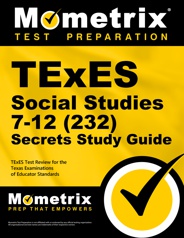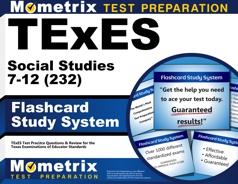The TExES Social Studies 7-12 (232) exam is administered for those interested in becoming an entry-level educator within the Texas public school system, specifically for teaching social studies to students from 7th to 12th grade.
Click “Start Test” above to take a free TExES Social Studies 7-12 practice test!
TExES Social Studies 7-12 Exam Outline
The TExES Social Studies 7-12 exam contains 140 selected-response questions and has a time limit of 4 hours and 45 minutes.
The exam is split into seven content domains, and the questions in each domain fall under one or more assessment standards.
I. World History (15%)
The questions in this domain fall under Social Studies Standard IV:
You are expected to apply knowledge of significant historical events and developments and multiple historical interpretations and ideas in order to facilitate student understanding of relationships between the past, present, and future.
These are the specific areas covered in this domain:
- Ancient world civilizations
- World history (600 AD to 1450 AD)
- World history (1450 AD to 1750 AD)
- World history (1750 AD to present)
II. US History (20%)
The questions in this domain fall under Social Studies Standard IV (see above).
These are the specific areas covered in this domain:
- Exploration and colonization
- Revolutionary Era
- The early years of the Republic
- Westward expansion
- The Civil War
- Reconstruction
- The US as a world power
- Political, economic, and social developments from 1877 to present
III. Texas History (13%)
The questions in this domain fall under Social Studies Standard IV (see above).
These are the specific areas covered in this domain:
- Exploration and colonization
- Independence
- Statehood
- Civil War reconstruction and aftermath
- Texas in the 1900s and 2000s
IV. Geography, Culture, and the Behavioral and Social Sciences (13%)
The questions in this domain fall under Social Studies Standards V and IX.
You are expected to apply knowledge of people, places, and environments to facilitate student understanding of geographic relationships in Texas, the US, and the world.
Standard IX: Culture
You are expected to understand cultures and how they develop and adapt, and use this knowledge to enable students to appreciate and respect cultural diversity in Texas, the US, and the world.
These are the specific areas covered in this domain:
- Physical geography concepts
- Natural processes
- Earth’s physical features
- Regional and global culture patterns
- Human geography
- Interactions between human groups and the physical environment
- Anthropological, sociological, and psychological concepts and processes
V. Government and Citizenship (13%)
The questions in this domain fall under Social Studies Standards VII and VIII:
You are expected to understand how governments and structures of power function, provide order, and allocate resources, and use this knowledge to facilitate student understanding of how individuals and groups achieve their goals through political systems.
Standard VIII: Citizenship
You are expected to understand citizenship in the United States and other societies and use this knowledge to prepare students to participate in society through an understanding of democratic principles and citizenship practices.
These are the specific areas covered in this domain:
- US democratic principles and government
- US citizenship and political processes
- Types of political systems
VI. Economics and Science, Technology, and Society (13%)
The questions in this domain fall under Social Studies Standards VI and X:
You are expected to understand how people organize economic systems to produce, distribute, and consume goods and services and use this knowledge to enable students to understand economic systems and make informed economic decisions.
Standard X: Science, Technology, and Society
You are expected to understand developments in science and technology and use this knowledge to facilitate student understanding of the social and environmental consequences of scientific discovery and technological innovation.
These are the specific areas covered in this domain:
- Economic concepts
- Types of economic systems
- Structure and operation of the US Free Enterprise system
- Societal significance of science and technology
VII. Social Studies Foundations, Skills, Research, and Instruction (13%)
The questions in this domain fall under Social Studies Standards I, II, and III:
You are expected to understand the social sciences and recognize their value.
Standard II
You are expected to effectively integrate the various social science disciplines.
Standard III
You are expected to plan and implement effective social studies curricula, instruction, assessment, and evaluation.
These are the specific areas covered in this domain:
- Social studies foundations and skills
- Sources of social studies information
- Social studies research
- Social studies instruction and assessment
Check out Mometrix's Study Guide
Get practice questions, video tutorials, and detailed study lessons
Get Your Study Guide
TExES Social Studies 7-12 Exam Registration
To register for the exam, you must create an online NES account via their website. Once your account has been created, you can use it to register for the exam and schedule an exam date.
When you register, you will need to pay the $116 examination fee.
Test Day
You should arrive at the testing center about 30 minutes prior to your scheduled exam appointment. This will leave you enough time to go through the check-in process. Once you arrive, you will be asked to present one form of valid, government-issued photo ID. If you arrive late or without your ID, you will not be permitted to take the exam.
After the check-in process, you will be asked to leave all personal items in a secure locker outside the testing area or in your car.
Once you enter the testing room, you will be given a brief tutorial on the computer-adaptive testing system, and you will be asked to sign an NDA. Once this is complete, the exam will begin.
How the TExES Social Studies 7-12 Exam is Scored
The TExES Social Studies 7-12 (232) exam is computer-adaptive. Here’s a look at how it works:
The first question is judged to be of medium difficulty, and depending on your performance, the next question may be easier or harder. If you do well on the first question, the second question will be harder; conversely, if you do poorly on the first question, the second question will be easy.
The questions on this exam are rated on a scale of 100-300. The higher a question is rated, the harder the question is (e.g., a question marked as 215 will be more difficult than a question marked 157).
To pass the exam, your final question must be on or above the 240 mark. If your final question is below this mark, you will not pass the exam, even if you have answered some questions above the 240 mark at some point during the exam. This is because the computer has rated the difficulty of your final question based on how you answered the previous questions.
Check out Mometrix's Flashcards
Get complex subjects broken down into easily understandable concepts
Get Your Flashcards
FAQs
Q
How many questions are on the TExES Social Studies 7-12 exam?
A
There are 140 selected-response questions on the exam.
Q
How long is the TExES Social Studies 7-12 exam?
A
The time limit for the exam is 4 hours and 45 minutes.
Q
What is the passing score for the TExES Social Studies 7-12 exam?
A
To pass the exam, you must achieve a minimum scaled score of 240.
Q
How much does the TExES Social Studies 7-12 exam cost?
A
The examination fee is $116.


